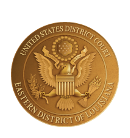 Herbert W. Christenberry was a lion of the federal trial bench in New Orleans, serving for almost 28 years, including 18 years as the first Chief Judge in the Eastern District of Louisiana. Judge Christenberry was a New Orleans native, born on December 11, 1897. He served in the Navy during World War I and was educated at New York University and Loyola University School of Law in New Orleans, where he earned his LL.B. in 1924, the same year he married Anna Born. Time Magazine once described him as "an old Huey Long man." After nine years as a private practitioner, he worked as Assistant Attorney for the Board of Commissioners of the Port of New Orleans from 1933 to 1935, Deputy Commissioner of the Louisiana Debt Moratorium Commission in 1935, Orleans Parish Assistant District Attorney from 1935 to 1937, and Assistant United States Attorney from 1937 to 1942. In 1942, he was appointed United States Attorney for the Eastern District of Louisiana by President Franklin D. Roosevelt, where he served until 1947, when he became United States District Judge after being nominated by President Harry Truman.
Herbert W. Christenberry was a lion of the federal trial bench in New Orleans, serving for almost 28 years, including 18 years as the first Chief Judge in the Eastern District of Louisiana. Judge Christenberry was a New Orleans native, born on December 11, 1897. He served in the Navy during World War I and was educated at New York University and Loyola University School of Law in New Orleans, where he earned his LL.B. in 1924, the same year he married Anna Born. Time Magazine once described him as "an old Huey Long man." After nine years as a private practitioner, he worked as Assistant Attorney for the Board of Commissioners of the Port of New Orleans from 1933 to 1935, Deputy Commissioner of the Louisiana Debt Moratorium Commission in 1935, Orleans Parish Assistant District Attorney from 1935 to 1937, and Assistant United States Attorney from 1937 to 1942. In 1942, he was appointed United States Attorney for the Eastern District of Louisiana by President Franklin D. Roosevelt, where he served until 1947, when he became United States District Judge after being nominated by President Harry Truman.
During his tenure on the federal trial bench, Judge Christenberry rendered so many significant decisions that all of them could not possibly be catalogued in this space. Among them, he ruled in 1952 that the publisher of The Times-Picayune and its affiliate, The States, violated federal antitrust law by forcing buyers to purchase space in the afternoon States, even if they only wanted to advertise in the monopoly morning paper, which Judge Christenberry determined was unfair competition for the rival afternoon paper, Item. Time Magazine quoted him in 1965 as saying, "I'm not a swinging liberal." However, Judge Christenberry "nonetheless compiled a record in civil rights cases that reflected abhorrence of racial discrimination . . . ." In 1958, he ordered racial desegregation of the admission practices of Louisiana State University in New Orleans. In 1965, he ordered the Bogalusa, Louisiana police department to protect civil rights demonstrators instead of harassing, arresting, or leaving them to be beaten by onlookers. Time Magazine reported that he directed the defendants that "you should do everything under the law to guarantee the constitutional rights of Negroes," and he chided the townspeople for appearing to fly nothing but Confederate flags rather than the American flag. In 1970, he ordered the racial desegregation of the local AFL-CIO asbestos workers union. In 1971, he enjoined Orleans Parish District Attorney Jim Garrison from continuing to prosecute Clay L. Shaw for alleged perjury and other criminal charges after Garrison's unsuccessful trial of Shaw for conspiracy to assassinate President John F. Kennedy on grounds that Garrison was engaging in unconstitutional prosecutorial misconduct.
Time Magazine described Judge Christenberry as "a tough old bird [who] has not been notable for taking any guff from anyone." Fairclough wrote that he was "a plain-spoken, no-nonsense judge who did not like to be trifled with." Judge Christenberry died on October 5, 1975, while still in the service of his court.
